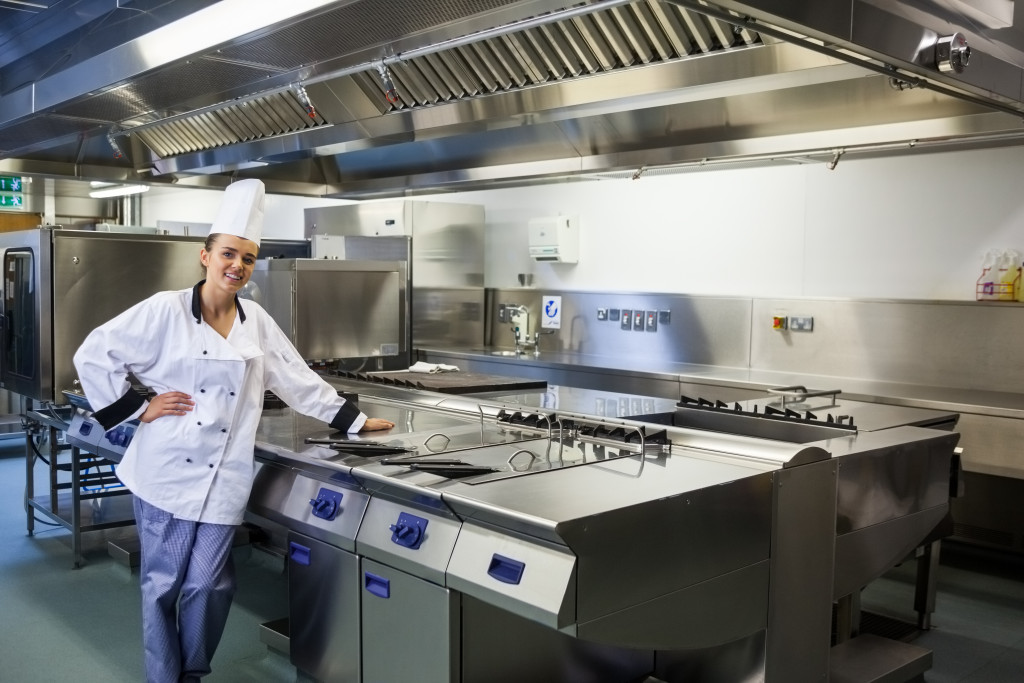- Quality materials in kitchen construction, mainly stainless steel, bolster long-term cleanliness and durability.
- Implementing a strict cleaning schedule, with clear roles and regular inspections, ensures consistent sanitation.
- Adequate staff training in cleaning procedures promotes effective and up-to-standard cleanliness.
- Stringent pest control measures maintain a pest-free environment, including regular professional inspections and proper food waste management.
The restaurant business plays a crucial role in local communities. It provides a place for community members to gather and enjoy meals and significantly contributes to the local economy. According to the National Restaurant Association, the restaurant industry accounts for 4% of the U.S. GDP and employs nearly 10% of the national workforce. These establishments pay local taxes, contributing to community infrastructure and services. Thus, maintaining cleanliness in your commercial kitchen protects your customers’ health and safeguards your community’s economic health.
However, a clean commercial kitchen is not just about keeping the area tidy and organized. It should begin as soon as construction and be maintained every day. Here are a few tips to help ensure cleanliness in your commercial kitchen.
Use Quality Materials for Construction

Quality materials are fundamental to the construction of a commercial kitchen. Notably, food industry-grade materials such as stainless steel are an excellent choice due to their durability, ease of cleaning, and food and water damage resistance. When adequately welded, stainless steel leaves no room for food particles or bacteria to hide, thus enhancing cleanliness.
Ensure to engage services from a reputable food industry stainless steel welding provider. These professionals use techniques that create a seamless finish, reducing the chance of food residue accumulating in crevices. They can also advise on the best layouts and designs for efficient cleaning routines.
It’s critical to remember this during the construction phase as it can save time, energy, and resources in maintaining the cleanliness of your commercial kitchen down the line. With food industry stainless steel welding services, you invest in materials and craftsmanship that uphold the highest hygiene standards, protecting your reputation, customers’ health, and your business.
Maintain a Strict Cleaning Schedule

Maintaining a strict cleaning schedule is crucial to the cleanliness of your commercial kitchen. It helps keep your restaurant sanitary and ensures the food you serve is safe. A comprehensive and strict cleaning schedule is a proactive step towards preventing foodborne illnesses, protecting your reputation, and adhering to health regulations.
Create a Cleaning Checklist
Creating a comprehensive cleaning checklist is the first step in maintaining a strict cleaning schedule. This checklist should encompass all areas that require cleaning, from the countertops and cutting boards to the ovens and refrigerators. Regularly updating and referring to this list will ensure all cleaning tasks are completed on time and to the standard.
Train Staff on Proper Cleaning Procedures
Training your kitchen staff on proper cleaning procedures is as important as the cleaning itself. This ensures your team knows how to effectively clean each part of the kitchen and correctly use cleaning chemicals. Regular training sessions will ensure your staff is up-to-date with cleaning best practices and regulations.
Assign Cleaning Responsibilities
Assigning clear cleaning responsibilities to each staff member will ensure accountability and consistency in cleaning. This not only helps ensure all tasks are completed, but it also fosters a culture of cleanliness among your staff.
Regular Inspections and Adjustments
Lastly, regular inspections are necessary to maintain a strict cleaning schedule. These inspections will help identify any areas that may need more attention or if any adjustments need to be made to the cleaning checklist or schedule. Regular inspections also demonstrate to your staff the importance of maintaining a clean kitchen, further reinforcing the culture of cleanliness.
Be Wary of Pests
Pests pose a significant risk to the cleanliness and safety of a commercial kitchen. Not only can they contaminate food and kitchen surfaces, but their presence can also lead to severe health code violations, tarnishing the reputation of your business. Thus, it is crucial to adopt stringent pest control measures to protect your kitchen, staff, and customers.
Regular pest control is a must in a commercial kitchen. Engage the services of a professional pest control company that specializes in restaurants and commercial kitchens. These experts can implement preventative measures and treat any existing infestations. Scheduling regular inspections will help catch any potential pest problems early, minimizing the risk of an infestation.
Proper food storage is vital to preventing pests. Ensure all food items are stored off the floor and in sealed containers. This reduces the likelihood of attracting pests and maintains the quality and safety of your food.
Proper disposal of waste is crucial in pest control. Waste bins should be sealed and emptied regularly to prevent attracting pests. Additionally, the area around the waste bins should also be kept clean.
By adopting these measures, you can maintain a pest-free commercial kitchen, ensuring a clean and safe environment for your staff and customers.
Final Thoughts
Maintaining cleanliness in your commercial kitchen is not just about keeping the area tidy and organized. It is an essential aspect of running a successful restaurant business that contributes to the health and well-being of your customers, staff, community, and, ultimately, your bottom line. By using quality materials during construction, following a strict cleaning schedule, and being proactive in pest control measures, you are investing in the long-term success of your establishment.




